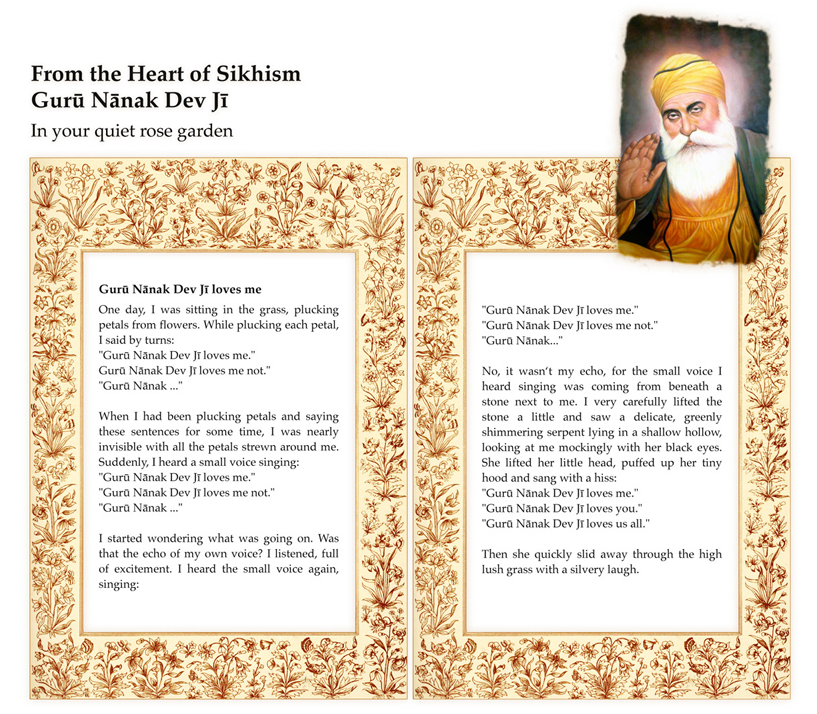Bhagat Trilochan ji had heard about the fame of Bhagat Namdev Ji and reached Narsi Bamni for an audience with him. In his very first meeting he requested Bhagat Namdev Ji to give him a glimpse of the Almightly. Bhagat Namdev Ji replied ," You shall also have the sight of Almighty if you contemplate on Him with devotion while working with your hands and legs at the same time." However Bhagat Trilochan Ji persuaded Bhagat Namdev Ji to bless him with His glimpse. Bhagat Namdev Ji humbly pleaded to Almighty to fulfill Bhagat Trilochan's request
Trilochan Ji came back to his village and started serving every mendicant who came that way. The company of the Holy men liberated him of desire for worldly materials and the fear of death.
Time passed away and Bhagat Trilochan Ji became very famous among the saints. A group of saints would always remain present at his place. He always served the saints at his residence with the utmost dedication and humanity. Bhagat Trilochan Ji always gave more importance to Bhakti (love & devotion) in preference to selfish interests. He said that he who is always occupied with problems relating to wealth and property will never become happy. As the number of visiting saints kept on increasing it became difficult for Bhagat Trilochan Ji' and his wife to do the household work. So she asked Bhagat ji to have a servant who could help in the household work.
When Bhagat Ji was about to leave home to search a worker who could help in the household work a boy appeared at the door of his house. Upon inquiring the child told Bhagat Ji that his name was 'Antarjami' (also means the knower of all hearts) and he is looking for work.
Next day, After giving him instructions, Bhagat ji asked him about how much salary he wanted. The servant (God disguised Himself) said politely," What would I do with my salary because I have no relatives in this world. I will work without pay. What ever you give me to eat and wear, I will accept it. But I have one condition. If you try to slander or talk behind my back, I will not stay here. That is all my pay and the conditions."
Bhagat Ji introduced Antarjami to his wife and told her to explain him his work and also asked her to feed him to his satisfaction and do not talk bad about him and his habits with the people. Time went on and a year passed. Every body was happy by the service of Antarjami.
One day Trilochan Ji's wife was talking with her neighbor. Her neighbor asked her why she was looking pale and weak because she was a very radiant lady. She started telling her neighbor about the Antarjami, about his eating habit. She said, "I'm unable to cope up with his meals. He eats a lot. Her neighbor suggested her to replace the servant with someone else.
Antarjami was the manifestation of the God Himself. He came to know of the conversation between Bhagat Ji's wife and her neighbor. So he left the home as the wife had violated the condition on which Antarjami had agreed to work in Bhagat Ji's home. When Trilochan Ji's wife returned after having a nice chatting. She was shocked to find the house unattended and servant missing.
Trilochan Ji asked her wife about him but she wasn't able give any satisfactory reply.
One day Trilocan Ji were sleeping, voice cried, "Hey Trilochan your servant, Antarjami was indeed a 'antarjami', the Almightly himself. He came to you on the recommendations of Bhagat Namdev Ji."
On finding out Bhagat Trilochan jis wife felt sorry about what she had done. Bhagat Trilochan Ji's hymn in Sri Guru Granth Sahib Ji explains:-
"One Universal Creator God. By The Grace Of The True Guru:
Why do you slander the Lord? You are ignorant and deluded.
Pain and pleasure are the result of your own actions.||1|Pause||"
Upon hearing Bhagat Trilochan's sermons in the hymn above, his wife understood that life's joys and pains are brought about by man performing misdeeds instead of singing the praises of God. Thereafter, she was in bliss.



